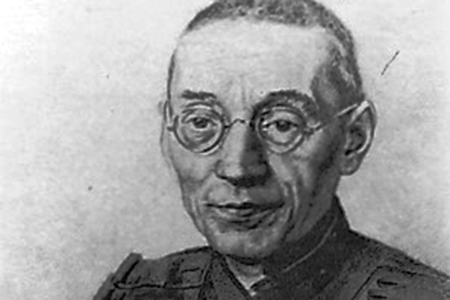The poem ‘O Jesus’, which Titus Brandsma wrote – and which was smuggled out of the prison – is for many people a comfort.
The Inscription
Titus wrote the poem in two days, 12 and 13 February 1942, in the convict prison of Scheveningen – established for political prisoners. The poem places itself ‘Before the image of Jesus’. In his cell, Titus has fixed three small illustrations from his breviary on his small folding table: the image of Christ on the cross, with the wounds of the Sacred Heart; St Teresa with her saying Mori aut pati (to die or to suffer); and St John of the Cross with his Pati et contemni (to suffer and to be scorned).
The Opening Line
The opening line evokes the atmosphere of contemplative attention. Seated silently ‘before the image of Jesus’, Titus Brandsma keeps his loving gaze directed to Jesus on the cross. The lament ‘O Jesus’ expresses the intimacy of his attention.
Once more alive, That… That…
Titus prayerfully explains what is happening whilst he gazes: ‘Once more alive…’ Devotion causes us to ‘rise up out of tepidity’ and ‘awakens love’. In his description of the movement of love coming from Titus and the counter movement coming from Jesus, Titus describes not only the reciprocal love he experiences but, more than that, a special friendship.
Good friends should mutually care for each other so that the value of friendship is not lost. In ‘O, Jesus’ the special nature of the friendship arises out of the mutually shared suffering.
Suffering shared in Friendship
A friend asks for the courage to suffer, a ‘special friend’ asks for ‘the courage to suffer more’, certainly when it concerns the friendship with Jesus who bears the suffering of humanity. Whoever suffers with his friend is like him. Thus, the disciples of Jesus ‘resemble’ Him who had gone before them on the way of ‘suffering’ in solidarity in suffering which leads into his Kingdom of peace. Friends desire to ‘resemble’ each other, they do not wish to see their friend standing there all alone, they wish to share the lot of their friend. In this spirit Titus says: ‘Oh, for me all suffering is good’. Friends bear each other’s suffering, through which ‘all suffering’, which in itself is evil, is ‘good’ for ‘me’ as a ‘friend’.
The Union with God
Does Titus mean a glorification of suffering? No, a spiritual logic is at work here: in suffering shared in friendship is the way of the good; bliss is the ultimate flowering of the good; this is the union with God. The friend ‘knows’ that his friend has taken his suffering seriously. It no longer belongs to him alone. His friend also bears it. However, what is of most importance here is the ultimate goal of the way: the union with God. This is, the heart of all devotion. The suffering reaches beyond the awareness of itself and can – as in ecstasy – only call out: ‘O God’.
O, leave me here
Titus notes in his prison letter that it can be ‘very cold’ in the winter. But this does not need to change for him: ‘Just leave me here’, here ‘before the image of Jesus’.
At this point in the poem the motif ‘with me’ begins to resound. The solitariness serves the interiorization of the bliss which was received in the shared suffering of the friendship. The ‘here alone’ does not become ‘weary’.
Your Presence makes all things good for me
Solitariness is the place where Titus can expose himself to the bliss of the suffering shared in friendship. For Titus the meaning of ‘Jesus with me’ and ‘never so close to me’ lies in the suffering shared in friendship as a way to Jesus’ Kingdom, leading to the union with God which reaches a climax in the last two lines: ‘Stay with me, with me, Jesus sweet, / Your presence makes all things good for me’. The occupying power defines the course of events ‘in prison’, but this far ‘here’, in the cell of Titus ‘before the image of Jesus’, its influence does not extend.
Download the Leaflet 8 O Jesus when I gaze on you here

